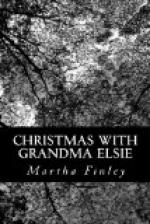“Yes,” returned Rosie; “I wonder why they don’t have some of the boys in the class too.”
“When did Columbus discover America, Miss Maud?” asked Harold.
“In 1942,” returned Maud with the air of one who is quite confident of the correctness of her reply.
“A miss for you,” said Harold. “Next. When did Columbus discover America?”
“In 1620, just after the landing of the pilgrims,” answered Sydney.
“Another miss,” said Harold. “Next.”
“Something happened in 1775,” said Eva meditatively.
“Oh!” cried Rosie, “Columbus’ discovery was long before that—somewhere about the year 1000, was it not, Mr. Travilla?”
“A miss for each of you,” replied Harold, shaking his head. “What year was it, Lulu?”
“It must have been before I was born,” she answered slowly, as if not entirely certain—“Yes, I’m quite sure it was, and I can’t remember before I was born.”
“A miss for you too,” said Harold. “You have every one missed and will have to con your task over again.”
At that each girl opened a book which she held in her hand, and for several minutes they all seemed to be studying diligently.
“Ah, ha! ah ha! um h’m! mis-con,” murmured Cousin Ronald, half-aloud; “vara weel done, lads and lasses. What’s the next syllable? strue? Ah ha, um h’m! we shall see presently,” as the books were closed and the young actors vanished through the door into the hall.
They were hardly gone when Zoe entered, carrying a small basket filled with flowers which she began to strew here and there over the floor.
“Ah ha! ah ha! um h’m!” cried Cousin Ronald, “she strews the flowers; misconstrue is the word na doot.”
“Ah Cousin Ronald, somebody must have told you,” laughed Zoe, tripping from the room.
“Oh!” cried Rosie Lacey, “I see now why the boys didn’t take part this time; because they couldn’t be miss.”
“Here they come now, boys and girls too,” exclaimed Grace. “Why how they’re laughing! I wonder what’s the joke?”
They were all laughing as at something very amusing, and after entering the room did nothing but sit or stand about laughing all the time; fairly shaking with laughter, laughing, laughing till the tears came into their eyes, and the older people joined in without in the least knowing the exciting cause of so much mirth.
“Come, children, tell us the joke,” said Mr. Dinsmore at length.
“O grandpa, can’t you see?” asked Rosie Travilla, and they all hurried from the room, to return presently in a procession, each carrying something in his or her hand.
Harold had a log of wood, Herbert a post, Max a block, Frank the wooden part of an old musket, while Chester, though empty-handed, wore an old fashioned stock or cravat and held his head very stiffly.
Maud, dressed as a huckster, had a basket filled with apples, oranges, nuts and candies. Sydney, wearing an old cloak and straw hat, had a basket on her arm in which were needles, tapes, buttons, pins, and other small wares such as are often hawked about the streets.




